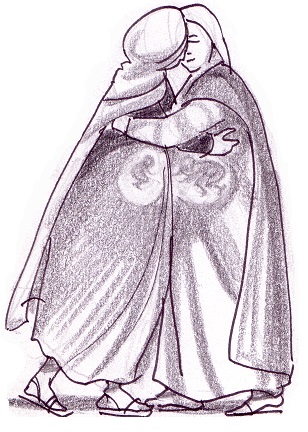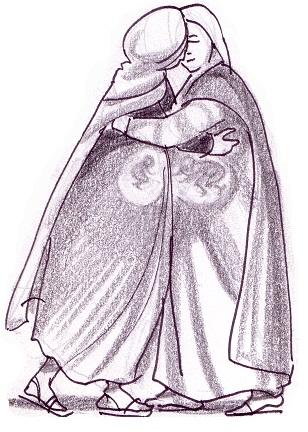

"Blessed are you among women” (Luke 1:42).
Song 2:8-14 or Zeph 3:14-18a; Luke 1:38-45
Luke’s story of the Annunciation is immediately followed by Mary’s journey to Judea to the house of Elizabeth, the story of the Visitation. Mary’s arrival and the leaping of the unborn John in Elizabeth’s womb have been compared to the story in 2 Samuel 6:14 of David dancing before the ark as it arrives in Jerusalem. The presence of God quickens the joy of fulfillment in both stories.
Luke has composed his infancy narratives to link many scriptural moments being fulfilled as we approach the birth of Jesus. Elizabeth is one of a series of women unable to conceive going back to Sara, mother of Isaac, and Hannah, mother of Samuel. Mary, a virgin, surpasses all other miraculous pregnancies. She is full of grace, the start of the new dispensation. As she enters the house, John leaps and Elizabeth proclaims that God’s promise of salvation is being fulfilled by the child Mary is carrying.
This is a beautiful story, rich in theological connections, but it is also an affirmation of the central role of faithful women who proclaim the Gospel. We see them and hear their voices throughout the narratives of the life of Jesus, and they are the first witnesses to the resurrection, the birth of new life over death and sin.
The scene of the Visitation is also followed by Mary’s canticle. What was announced and realized in her will be magnified to encompass the whole world. In Mary’s fierce song we find the connection of the birth of Jesus to God’s promise to bring justice to the earth, the vindication of the women and children who have always been the first victims of abusive power. They are now the first ones to receive news of the entry of God into human history on behalf of the poor.
Our advent pilgrimage will arrive at Christmas this week. We are facing “the worst of times and the best of times,” the opening words of Dickens’ Tale of Two Cities, a story of self-sacrificing love in the face of chaos and suffering. Crisis offers opportunities for virtue and the courage to see our way to better days with lessons learned. In future years looking back at the Advent and Christmas of 2020, will we recognize ourselves as a continuation of the original story of faith, hope and love that Mary and Elizabeth began? We are today’s heralds of the Good News they welcomed and proclaimed.
Advertisement








